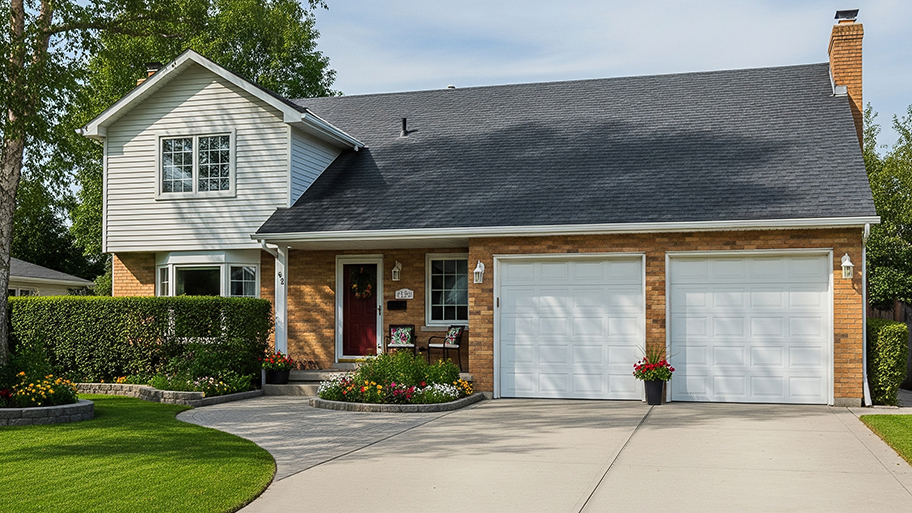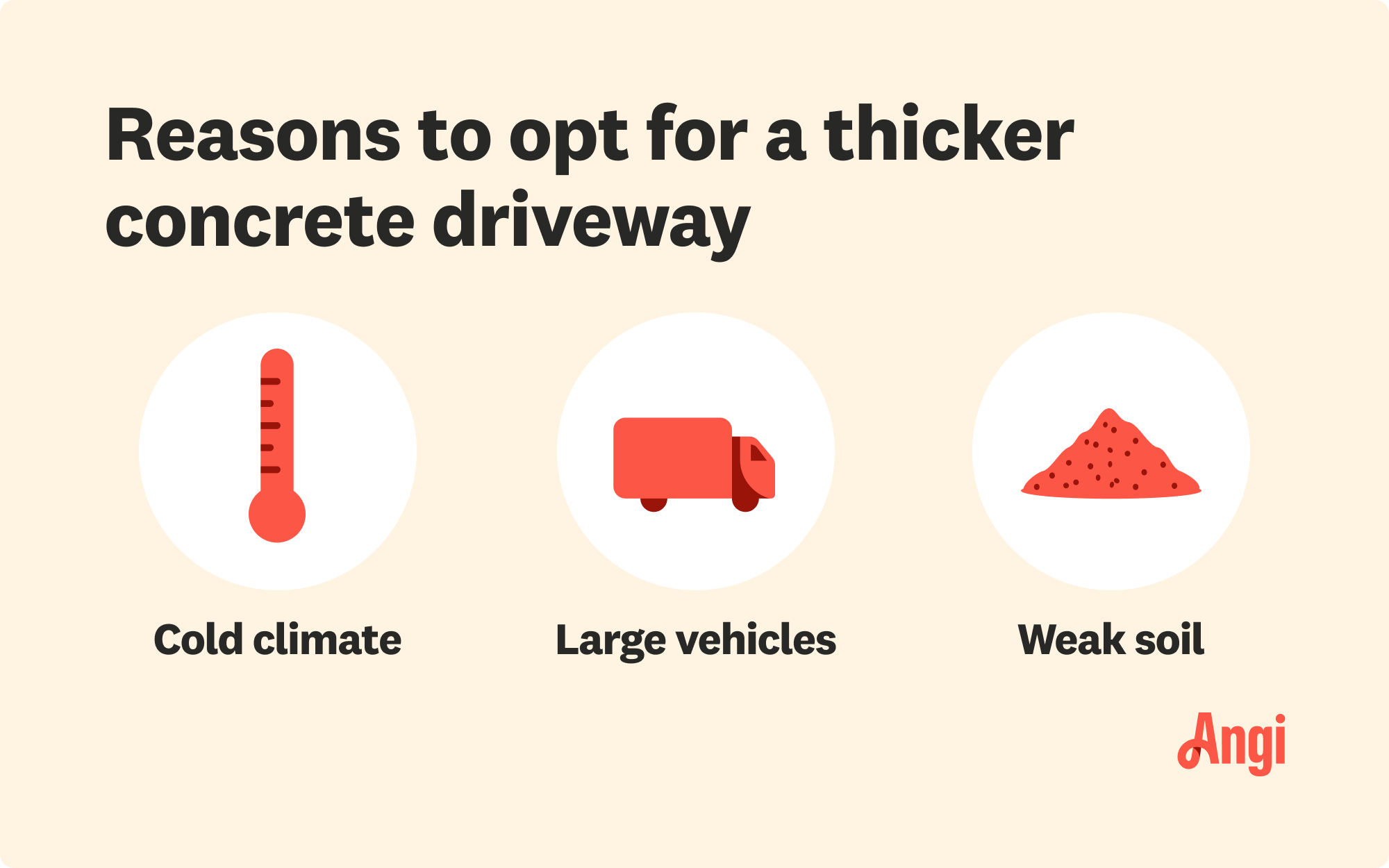
Concrete driveways stand up to a lot of pressure over the years. How much do concrete driveway repairs cost when it's time to give it a little TLC?
Concrete driveway thickness matters for safety, longevity, and much more


The standard concrete thickness for driveways is 4 inches.
There are many factors, including the environment and vehicle weight, that dictate proper concrete driveway thickness.
Investing in the right driveway thickness can reduce the risk of cracking and sinking concrete.
A well-constructed concrete driveway is an essential feature of any home, providing a durable and aesthetically pleasing surface for vehicles and foot traffic. Determining the right concrete driveway thickness is essential to ensure its longevity. This guide discusses how thick a concrete driveway should be so you can start planning for your driveway project.
The minimum concrete thickness for a driveway is 4 inches, and residential driveways sit between 4 and 6 inches thick. Larger driveways that need to support multiple vehicles will sit toward the upper end of that range. Driveways that need to support commercial vehicles should be 6 to 8 inches thick and up to 12 inches for heavily trafficked areas.
For most homes, a 4-inch driveway will suffice. However, there are a few factors to consider to make sure you choose the right driveway thickness.
When it comes to concrete driveways, it's important to consider the thickness based on the load they'll need to bear. Residential driveways are designed to handle regular passenger vehicles, so a thickness of between 4 and 6 inches will be sufficient. A thickness closer to 6 inches is a good idea if you frequently anticipate heavy vehicles like trucks or SUVs using the driveway.
If you park heavy commercial vehicles on your driveway, you’ll want at least a 6-inch slab, and going up to 8 inches will reduce the risk of cracked concrete even further.
Working with a contractor with experience installing concrete driveways will help you determine the right thickness for your needs.
The soil's stability beneath your driveway is essential when figuring out how thick the concrete should be. If the soil has a low load-bearing capacity or is prone to expansion and contraction, you might need to go for a thicker layer of concrete to prevent cracks from forming from uneven support. If you know you have clayey soil in your area, take the base thickness—4 inches for residential driveways and 6 inches for commercial driveways—and add 2 inches for extra safety.
To understand what's going on with the soil, conduct a soil analysis or get advice from a geotechnical engineer. They can provide valuable insights into the soil conditions and help you determine the right thickness for your driveway. It's all about ensuring your driveway stays strong and sturdy for the long haul.
Weather conditions can significantly affect the durability of a concrete driveway. In regions with brutal winters, below-freezing temperatures, and heavy snow, it’s a good idea to opt for thicker concrete to withstand the expansion and contraction caused by temperature fluctuations.
Similarly, areas with high temperatures (over 90 degrees Fahrenheit) or heavy rainfall (3 inches or more in 12 hours) may require thicker concrete to resist potential damage from heat or water. Considering these weather factors will ensure your driveway remains in good shape over time.
Note that weather conditions while pouring your concrete can also affect the strength of the slab. The summer is normally the best time to pour concrete, and make sure you get the job done when there’s no rain in the forecast for at least a few days.
Complying with local building codes and regulations is a must because they are in place to protect you from dangerous conditions. These codes often specify the minimum thickness requirements for your area based on the factors mentioned above. Once you know more about local codes, examine other materials to use, such as asphalt versus concrete driveways.

Even if you know how thick a concrete driveway should be, that doesn’t mean there isn’t the possibility of pouring the wrong amount. If you pour the wrong concrete thickness, you may run into durability and strength issues. Your driveway will be more likely to crack and experience sinking if the thickness isn’t enough for your soil, climate conditions, and vehicle traffic. If you make your concrete driveway too thick, the only downside is a higher up-front installation cost.
If you’re experiencing cracks or crumbling, call a concrete driveway contractor to examine your concrete to see if it needs to be fixed.
Selecting the appropriate thickness for your concrete driveway is crucial as it directly affects the installation cost as well as driveway longevity. While opting for a thicker driveway may entail more materials and additional labor during construction, it is a worthwhile investment in the long term, reducing the need for yearly repairs or—worse—a redo, which can cost up to $6,000, depending on the factors we mentioned earlier.
You can choose the driveway thickness you want based on your budget and preferences, but working with a professional to pour the concrete is crucial for achieving optimal results and minimizing expenses. A local concrete driveway company will have a professional appearance and the risk of damage and expensive repairs going forward will be minimized.
From average costs to expert advice, get all the answers you need to get your job done.

Concrete driveways stand up to a lot of pressure over the years. How much do concrete driveway repairs cost when it's time to give it a little TLC?

Whether you’re planning on putting in a concrete driveway, patio, or staircase, use this concrete delivery cost guide to get an accurate estimate.
Need to breathe new life into your exterior stoop? Use this guide on concrete step repair cost to see the price of a professional repair.

Concrete may be strong, but it's surprisingly sensitive to extreme temperatures. Here's what to know about pouring concrete in cold weather.

Did you know there are different types of pre-mixed concrete? Learn what project each type is best for, important terms, and more.

Before hiring a concrete driveway contractor, you should know what you’re looking for. Here’s what you need to know on how to hire a driveway contractor.